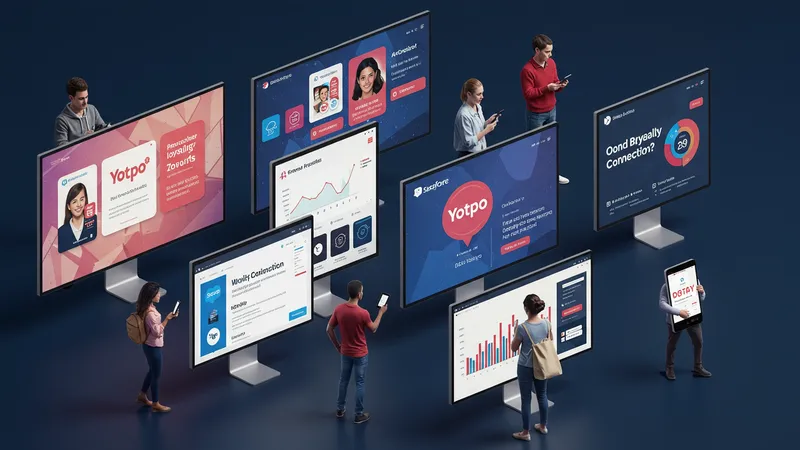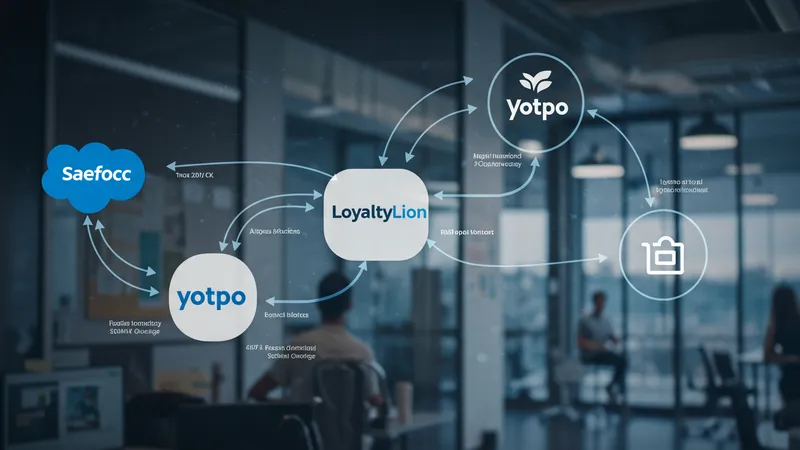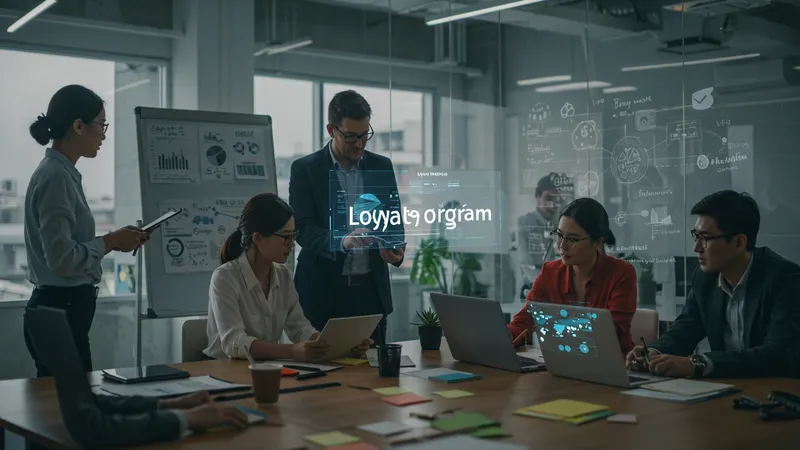

Today’s competitive marketplace has made customer retention more vital than ever. Companies are no longer simply offering products or services; they’re cultivating long-term relationships through sophisticated systems designed to reward engagement, boost satisfaction, and maintain loyalty. Specialized firms now help modern businesses build dynamic programs that track customer interactions, award points, and deliver tailored incentives. These agencies leverage advanced analytics and digital tools to unlock deeper loyalty and ensure every customer feels valued.
Such firms operate at the intersection of technology and human behavior, creating solutions that transform customer experience into measurable results. Their strategies go beyond generic discounts, using data to shape meaningful rewards and engagement processes that directly align with a brand’s goals. This approach not only encourages repeated business but also turns enthusiastic clients into brand advocates willing to share their positive experiences.

Modern businesses increasingly turn to these dedicated firms to stand out in crowded markets. Unlike DIY loyalty programs, these providers offer customized journeys, flexible integrations, and robust reporting dashboards that track campaign performance in real time. Features like omnichannel engagement, AI-driven segmentation, and seamlessly integrated payment solutions are now vital for brands seeking measurable improvement in customer lifetime value.
Analyzing top firms reveals a spectrum of offerings—from enterprise-level platforms with advanced analytics to plug-and-play software for growing e-commerce startups. While pricing varies significantly, each brand focuses on transforming basic programs into memorable, engaging experiences. The best solutions not only automate points and rewards but allow for rapid operational changes as consumer trends shift.
Third-party management allows brands to focus on core competencies while benefiting from cutting-edge loyalty technology. For instance, Salesforce’s cloud-based platform is prized for its data integration, while Fivestars is valued among small business owners for ease of use and affordability. B2B and B2C clients alike can access tailored reward types, ranging from exclusive experiences to tiered discount schemes—all with the expert support of a specialized firm.
The advantages can be significant: brands using expert-managed loyalty solutions tend to see higher engagement and retention rates, as well as increased average spend per customer. With a clear overview of strategies, performance, and opportunities for growth, modern businesses are equipped to stay agile and customer-focused. The deeper details reveal even more valuable insights ahead—especially when these solutions are broken down by features, integration capabilities, and practical performance metrics.
Feature sets are often the first major difference that distinguishes one loyalty solution from another. For example, Salesforce Loyalty Management is recognized for robust CRM integrations and personalized rewards that adapt to individual user behavior. Meanwhile, Yotpo specializes in e-commerce, offering easy integration with platforms like Shopify and Magento, and leveraging user-generated content to increase program participation.

Centralized analytics dashboards are a hallmark of firms like Bond Brand Loyalty and Annex Cloud, providing real-time views of how rewards drive customer activity across multiple touchpoints. These firms allow for seamless omnichannel engagement, connecting physical retail, online shopping, and mobile interactions under a single rewards ecosystem. For businesses targeting wide demographic groups, this flexibility and consistency underpin strong loyalty outcomes.
Beyond basic point accrual, advanced rule engines such as those offered by Talon.One and Kobie enable highly customizable rewards—like surprise gifts, partner perks, or behavior-triggered bonuses. This allows businesses to differentiate themselves, engineer memorable experiences, and respond instantly to market trends or customer feedback. Tiered reward structures, referral incentives, and gamification are increasingly common elements woven into these platforms.
Firms such as SessionM deliver on personalization through AI-powered segmentation, adjusting messaging and offers to match customer lifecycle stage or predicted preferences. These advanced suite options can require greater upfront investment but often justify their costs in long-term gains like higher customer satisfaction and lower churn. The breadth of features available means firms can cater to both massive global enterprises and niche market newcomers.
Seamless integration is essential for any loyalty management platform to deliver maximum value. Salesforce, for example, provides native compatibility with existing CRM and marketing automation stacks, ensuring customer data flows into loyalty logic without manual intervention. This not only supports personalization but also maintains data consistency and reduces operational silos.

E-commerce-focused solutions like LoyaltyLion and Yotpo cater to small and midsize retailers by offering plug-and-play integrations with major e-commerce systems, minimizing deployment times and technical barriers. As a result, businesses can quickly implement points, rewards, and referral systems without expensive custom development or large IT teams.
In contrast, platforms like Aimia and Bond Brand Loyalty often pursue highly bespoke, enterprise-level integrations. These usually require close consultancy to tie in multiple data sources, brick-and-mortar POS, mobile apps, and even third-party partner programs. The resulting ecosystem can support multinational operations, regional nuances, and future scalability—all crucial in industries like travel, hospitality, or financial services.
Fivestars demonstrates the importance of user-friendly setup, targeting local shops with tablet and app-based systems that sync instantly with POS hardware. The diversity among these firms means solutions exist for companies of any size, ambition, or technical expertise—all while minimizing friction and maximizing campaign speed to market. The ability to integrate deeply with daily operations makes loyalty programs more dynamic and insightful.
Measurement is central to the ongoing optimization and justification of rewards programs. The top loyalty management firms highlighted—such as Annex Cloud and SessionM—offer detailed analytics on customer engagement, average spend, repeat purchase rates, and redemption behaviors. Built-in tools enable quick identification of high-performing campaigns and underused incentives, allowing for rapid strategic adjustments.

Platforms like Kobie and Talon.One empower brands to run A/B tests, monitor promotional effectiveness, and calculate campaign-specific ROI. These actionable metrics are invaluable for refining reward structures and maximizing customer lifetime value without relying solely on assumptions. Firms continuously track meaningful KPIs such as active members, redemption rates, and net promoter scores.
Global providers, including Aimia and Bond Brand Loyalty, leverage advanced AI and data science to predict churn, segment audience groups, and attribute loyalty-driven revenue. Their clients benefit from real-time dashboards and custom reports that break down complex performance data into actionable insights, supporting smarter marketing investment and growth planning.
Even among smaller and growing brands, platforms like Fivestars and Yotpo supply concise reporting tools. These include metrics on new versus repeat customers, in-store versus online engagement, and reward redemption trends—all helping businesses understand the true financial impact of their loyalty initiatives. As measurement grows, so does the potential for innovation and targeted customer engagement.
Employing a specialized loyalty management firm confers significant advantages that extend well beyond basic retention. Businesses gain expertise in reward design, segmentation, and experiential marketing, often resulting in deeper emotional connections between brands and their customers. This can lead to organic word-of-mouth, reputation improvement, and increased competitive differentiation in saturated markets.

Strategically, custom loyalty solutions allow brands to adapt quickly to shifting preferences or new market entrants. Integrations with CRM, e-commerce, and analytics tools mean that marketing teams receive up-to-date insights and can pivot offers or messaging without disrupting operations. This agility supports innovation, experimentation, and resilience—critical qualities for long-term business health.
The impact on customer experience is equally notable. Customers who feel recognized and rewarded are more likely to return, provide feedback, and act as brand ambassadors. Firms like Salesforce and SessionM excel at personalizing interactions, delivering tailored incentives based on behavioral signals and loyalty tiers. This fosters satisfaction and increases average account value without significant increases in acquisition costs.
Ultimately, the broad suite of features, integration capabilities, and data-driven insights provided by leading loyalty management firms enables businesses to transform generic rewards into meaningful relationships. This translates into improved retention, measurable ROI, and a sustainable edge—helping companies thrive amidst rapid industry change and evolving consumer expectations.